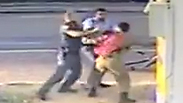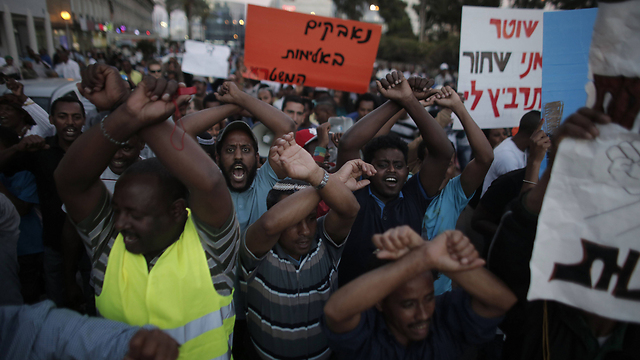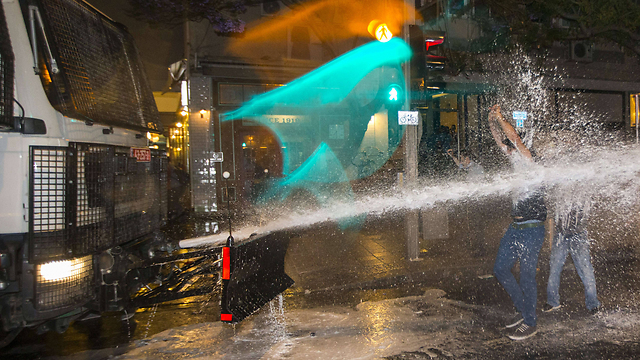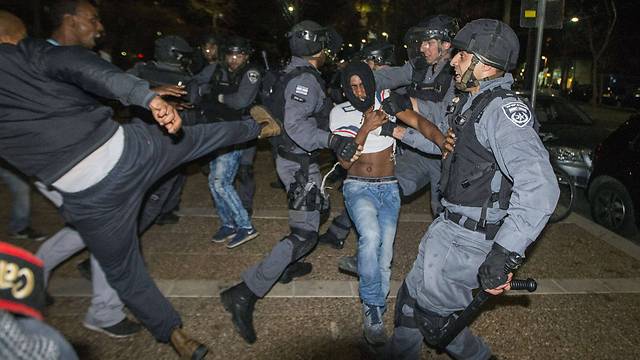
Ethiopian soldier 'deeply disappointed' by closing of police beating case
Justice Ministry decides not to file criminal charges in case of soldier beaten by policeman that sparked claims of racism and major protests in Ethiopian community.
"I'm deeply disappointed by the law enforcement bodies, and in general by the policeman and the Attorney General," said Pakada on Sunday evening.
Pakada's attorney, Eyal Abulafiya, said he intended to appeal the decision. "It's a bizarre decision that is full of internal contradictions, and it's pretty obvious from the decision what the Attorney General thinks about the man seen giving the beating in the incident," he said.
"It looks like there's an attempt to appease the police officer population," he continued. "Did those who made the decision see what the public saw or another video?"
Weinstein decided to adopt the recommendation of State Prosecutor Shai Nitzan and that of the Police Investigation Unit to close the case against the police officer.
However, the Police Investigation Unit recommended the case will be transferred to the Police Disciplinary Tribunal to examine the police officer's conduct.
The video of the beating led to an outcry by Israeli Ethiopians, who marched in protests around Israel in an attempt to raise awareness of discrimination, racism and police brutality. Protesters blocked major roads in Tel Aviv, and scores were wounded and arrested in clashes with police.
The Justice Ministry said the evidence in the case, including the video, shows that "after the policeman asked the soldier repeatedly to leave the site because of a suspicious package nearby, and the soldier refused and pushed the policeman, the policeman used force to remove the soldier. In response, the soldier punched the policeman and in return the policeman punched the soldier."
According to the statement, the policemen behaved "impeccably" in the situation.
The ministry concluded that the circumstances warranted consideration of disciplinary action, but did not call for criminal prosecution, and that there was no racial motivation behind the incident. It also noted that the policeman has already been fired from his job in the police.
The Justice Ministry emphasized that the soldier did not follow the policeman's orders and used violence. However, it continued, the circumstances also do not justify prosecution of the soldier for attacking a policeman.
Last month Pakada filed a lawsuit at Tel Aviv's Magistrate Court in which he demands NIS 390,000 (some $100,000) plus legal expenses in compensation from the police.
Abulafiya said it was a case of police brutality motivated by racism, "one of the more shocking cases seen recently in Israel, which was documented by security cameras by coincidence."
He went on to say that on top of police displaying serious racism, the case provided a rare glimpse "into a regular habit, which is wrong to the core, that happens frequently in the Israeli Police, who use violence against civilians, make false accusations, and more."
Following the protests, Prime Minister Benjamin Netanyahu said he had appointed a ministerial committee to address the integration challenges faced by Israelis of Ethiopian origin, including difficulties in the field of education, housing and employment.
After the incident was captured on video, MK Avraham Negusie of Likud suggested a Damas Pakada Bill, calling for police officers to wear cameras in order to document the arrest procedure or detention of an Israeli citizen.
The decision to close the criminal case came after a significant step by the police, when Commissioner Yohanan Danino declared days after the incident that the policeman would be fired, subject to a hearing.
Members of the Israeli Ethiopian community began voicing protest soon after the case was closed. Prominent activists said that the protest would be resumed.














